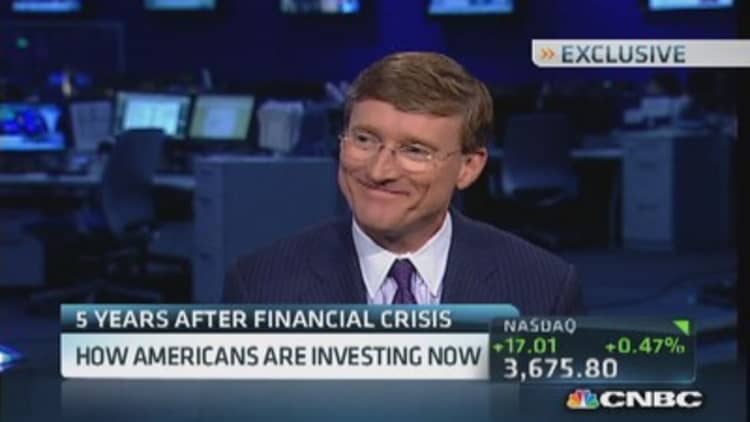It's no wonder that target-date funds have emerged as a welcome staple in many workers' 401(k) plans.
These funds, whose assets automatically shift into more conservative investments as individuals approach retirement, offer sophisticated and diversified exposure to Wall Street with little effort by the investor.
"Most investors tend to be hands-off," said Janet Yang, a senior analyst at fund-tracker Morningstar. "If you aren't willing to do the research of individual stocks or individual mutual funds and rebalance your portfolio once a year, target-date funds are a good 'set-it-and-forget-it' investment."
A target-date fund gets its name from the year in which an investor anticipates retiring. So, for instance, investors in a 2040 fund today will watch their assets gradually move from riskier investments—which come with the potential for higher returns—to more conservative options, such as bonds and cash, the closer they get to 2040.
Read MoreGiving to charity? Check this list
Financial advisors agree that for new investors, target-date funds are an ideal option.
"They are a great investment vehicle for investors who are just getting started and need broad diversification," said Brittney Castro, a certified financial planner and founder of Financially Wise Women.
But the funds are neither worry-free nor problem-free. For young investors, one of the biggest potential complications lies a couple of decades down the road.
"At that point, you might be married, which means you have your own 401(k) and your spouse's retirement funds, and you might have outside assets from an inheritance or in an IRA," said Charles Bennett Sachs, a certified financial planner with Private Wealth Counsel. "That's when it can be a problem, because you don't know your overall allocation."
This is due to the underlying investments in a target-date fund. The fund's manager will adjust assets as necessary to match the fund's stated goal of its aggressive/conservative mix. So you could be in a bunch of, say, tech stocks in that fund but also have your outside investments heavily tilted toward that sector, resulting in overexposure to one industry.
Read MoreAvoid these 8 retirement screwups
Additionally, there is broad disparity in the underlying investments of the nearly 2,200 target-date funds now out there, along with huge differences in exactly what path each follows as it moves from aggressive to conservative investments.
As of June 30, $690 billion was invested in target-date funds, according to data from Morningstar. By way of comparison, only about $44 billion was invested in such funds in 2004, and this year's figure is twice the $342 billion seen at the end of 2010.
Industry watchers doubt they will lose steam. Investment-research firm BrightScope predicts that more than $2 trillion will be parked in such funds by 2020.
The majority of people starting out in investing have little [knowledge] of the stock market, so a target-date fund is better as a default than having their retirement dollars go into a money-market fund.Charles Bennett Sachscertified financial planner with Private Wealth Counsel
Part of the growth can be attributed to their increasing status as the default option in many retirement plans; that is, if workers are enrolled in their company's 401(k) plan but do not pick a variety of mutual funds to comprise their nest eggs, their contributions automatically go into target-date funds.
This is a good thing, say advisors; a decade ago most 401(k) defaults were money-market funds, whose historic returns markedly trail those of stocks over time.
"The majority of people starting out in investing have little [knowledge] of the stock market, so a target-date fund is better as a default than having their retirement dollars go into a money-market fund," Sachs said. "It's perfect for people just starting out."
Read MoreThe dos and dont's of trusts
Advisors generally agree that when a worker has investments outside of a workplace retirement fund and the balance of a target-date fund hits the $100,000 mark, it's time to talk to a professional.
"The bottom line is that what was phenomenal for someone initially will eventually be outgrown," Sachs said. "You'll have to then move away from what used to work."
Another concern tied to target-date funds is that their associated fees run higher than many other professionally managed mutual funds. Higher fees means more money taken from the account, which translates into lower returns on investments.
The good news is that fees have stayed steady as more money is poured into them. According to Morningstar, the average expense for target-date funds stood at 0.84 percent at the end of 2013, compared with 1.04 percent in 2008. By comparison, the average expense for all mutual funds is 0.68 percent vs. 0.78 percent in 2008.
Kayse Kress, a certified financial planner with Connecticut Wealth Management who manages her firm's 401(k) business, cautions that the importance of fees should not be overblown, and they are not the sole reason to pick one target-date fund over another.
Read MoreQuarter of Americans save nothing
"Not all funds are created equal," she said. "Some are managed better than others.
"Fees are important, but they are not the only [aspect] to consider," Kress added.

Another issue is whether the target-date fund is, in industry jargon, a "to" or "through" fund. The to funds reach their most conservative point at the target date, while the through funds continue to seek growth for years after its date.
Morningstar's Yang said that roughly 75 percent of the industry assets are in through funds. These funds assume that when investors retire from the workforce, they likely will live for another 20 or 30 years and need their assets to continue growing.
Read MoreNeed a 401(k) boost? Sell your collectibles
The bottom line, say advisors, is this: Keep an eye on your target-date fund. Make sure it continues meeting your investment goals and your risk tolerance. When you are wary, it's time to consult a pro.
"It's a great option for people who don't have access to advice," said Drew Weckbach, a certified financial planner with Commerce Trust. "It's better than doing nothing."
—By Sarah O'Brien, special to CNBC.com





